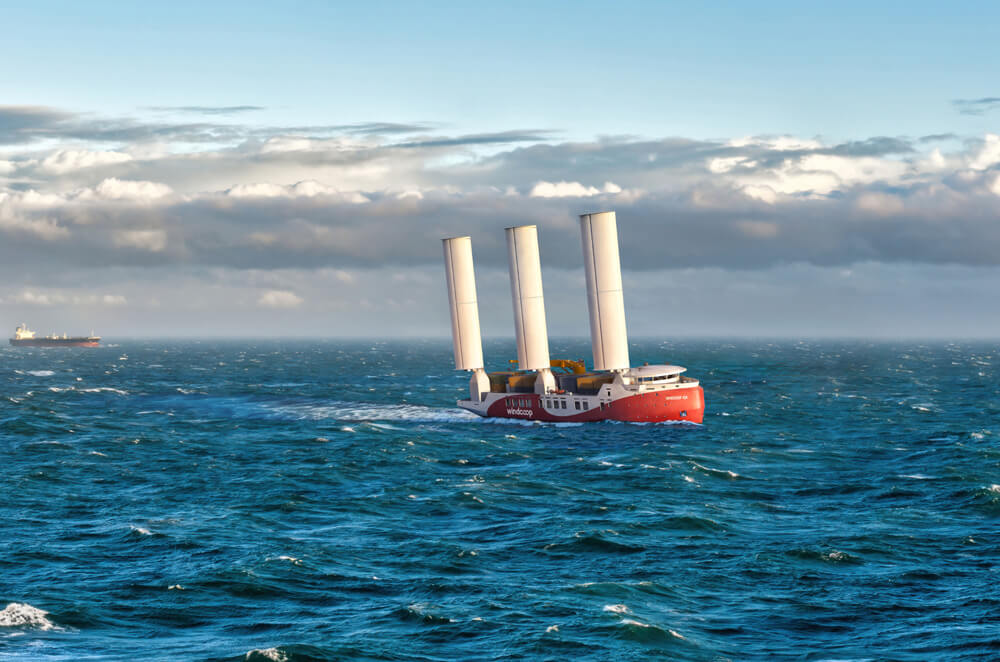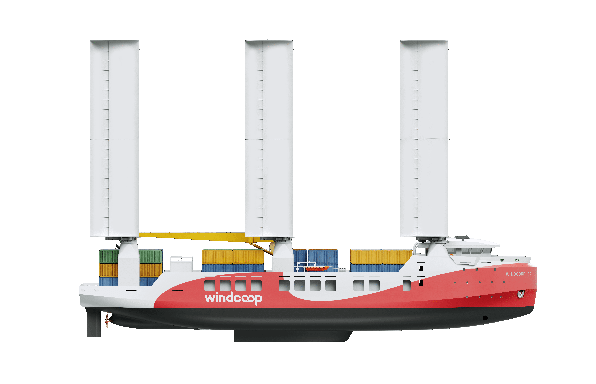Groundbreaking Initiative Launches First-Ever Sail-Driven Cargo Vessel
windcoop, a French cooperative, has just wrapped up the construction of its innovative open-hatch cargo ship powered by sails. This vessel marks the beginning of what Windcoop hopes will be a groundbreaking fleet. The ship was built by Turkey’s RMK Marine, which is also working on another sail-driven project called the RoRo Neoliner Origin.
The team faced important hurdles in merging wind propulsion with effective container handling. They tackled these challenges using asymmetrical sails and an open-hatch design, strategically placing cranes opposite the sails to maintain balance and stability during operations. This setup allows for seamless loading and unloading without compromising autonomy.
This new ship measures 91.3 meters (around 300 feet) long and can carry 210 TEU along with 40 reefer plugs. It features three wingsails from Computer Wingsails (CWS), each covering about 350 square meters (approximately 3,800 square feet), totaling around 1,050 square meters (11,300 square feet) of sail area. The expected cruising speed is about 9 knots.

“After four years of hard work, we’re finally making strides toward what once seemed like a far-fetched idea,” shared Matthieu Brunet, Windcoop’s Chairman. The initiative kicked off in 2022 through collaboration among Zéphyr & Borée, Enercoop, and Arcadie in Lorient.
The partnership with RMK includes sourcing components like sails and engines while finalizing studies and tank tests this year. Construction is slated to start in 2026 with trials set for May 2027.
The total budget for this project stands at €28.5 million ($31.5 million). Windcoop has secured financing through Crédit Maritime Grand Ouest – Banque Populaire alongside Bpifrance’s counter-guarantee; notably €6.8 million ($7.5 million) came from cooperative funding involving around 1,600 citizens as well as committed shippers such as Arcadie and Valrhona.

The inaugural route will target secondary ports often overlooked due to their limited capacity or equipment for loading goods efficiently—aiming to “rebalance logistics” while cutting down carbon emissions by minimizing land transport needs.This vessel will operate between France and Madagascar—specifically connecting Marseille with Tamatave, Diego Suarez, and Majunga—without requiring transshipment or navigating through busy ports like Suez Canal; they anticipate a transit time of roughly one month.Cargo transported from Madagascar will include aquaculture products such as fish farming supplies along with cocoa beans or vanilla pods while exports from France may feature retail items including textiles or glassware products.
Windcoop isn’t stopping here; they have plans to secure additional funding quickly so they can build another vessel that ensures monthly service on this route between Madagascar and France! Plus there are exciting prospects ahead: new maritime routes are being mapped out that cater specifically to shippers’ needs across regions—including potential lines within the Indian Ocean region plus direct connections over Atlantic waters towards West Africa!
Content Original Link:
" target="_blank">


















































